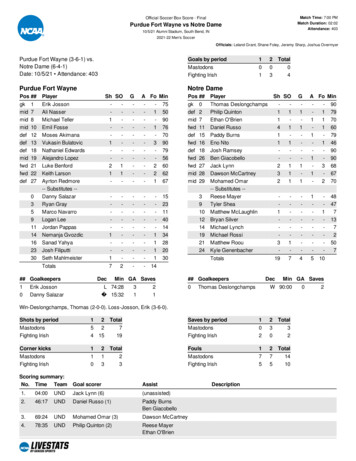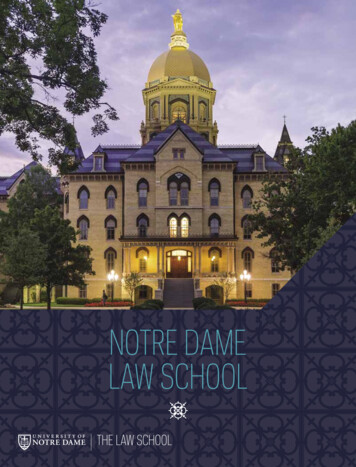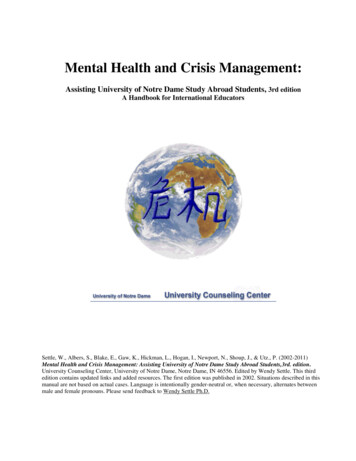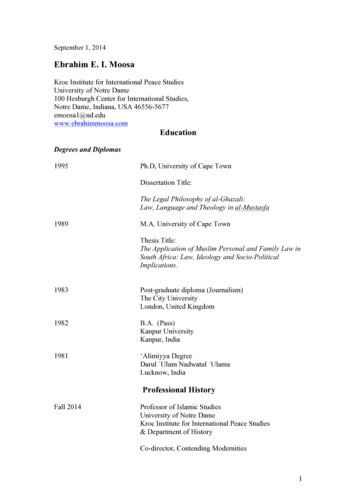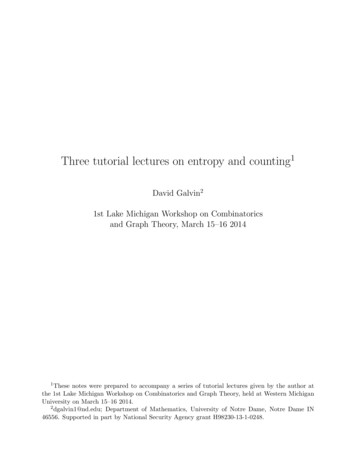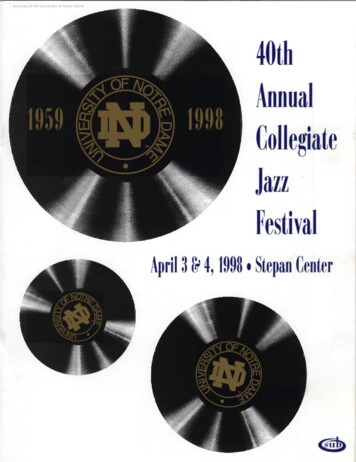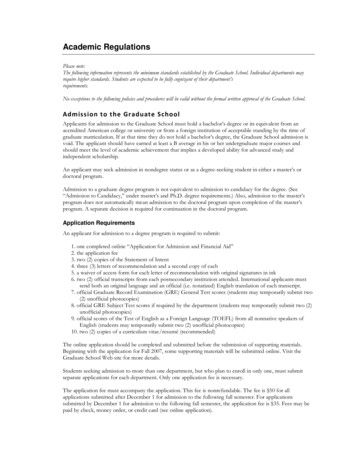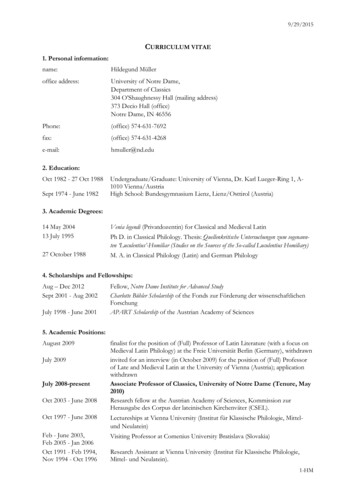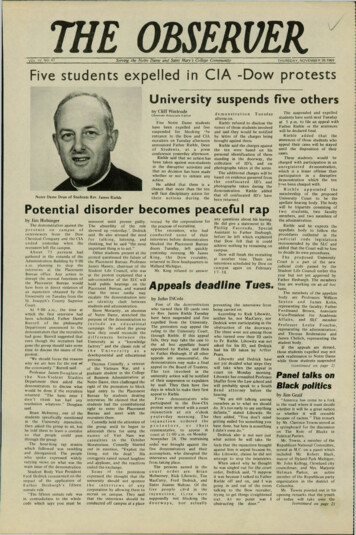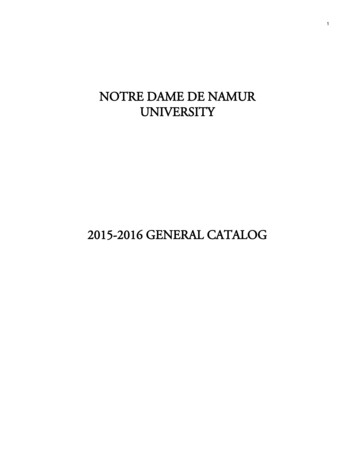
Transcription
1NOTRE DAME DE NAMURUNIVERSITY2015-2016 GENERAL CATALOG
2 NOTRE DAME DE NAMUR UNIVERSITY 2015-2016 CATALOG
ACADEMIC CALENDAR 32015-2016 CATALOGNature of CatalogThis Catalog is a complement to the Student Handbook and to information on the University website ("documents").Together, these documents serve as a guide to many of the student programs, policies, procedures, requirements andresources of the University. These documents do not form a contract with the student: tuition, student fees, course andcourse contents, curricular requirements and other matters referenced or set forth in these documents or otherwise relatedto students are subject to change at the discretion of the University at any time, during or after registration or courseenrollment, and with or without notice or written confirmation.Please note that only the President of the University may provide authorized final interpretation of the contents of thesedocuments and definite determination of their appropriate application to the particular circumstances of any individualmatter.Additionally, the University assumes no liability, and hereby expressly negates the same, for failure to provide or delay inproviding educational or related services due to a cause(s) beyond the control of the University. These causes include,without limitation, financial issues, power failure, fire, strikes, damage by the elements, other acts of God and acts of publicauthorities. While the University believes that the information contained in the Catalog and Handbook is accurate at the timeof publication, the University does not guarantee absolute accuracy. Please direct questions to the appropriate administratorin case of doubt or confusion.The catalog is a production of the Office of the Provost and the Office of the Registrar. Special thanks go to Greg White,Ph.D., Associate Provost, and Evelia Chacon, Registrar’s Assistant for their efforts to make the catalog as complete and correctas possible. Please direct any comments to the Office of the Registrar.
4 NOTRE DAME DE NAMUR UNIVERSITY 2015-2016 CATALOGACADEMIC CALENDARFall Semester 2015Registration ConfirmationClasses Begin: Traditional Undergraduate Holiday:Labor DayClasses Begin: Undergraduate Evening/IntensiveEvening Term 1/GraduateLast Day to Add: Intensive Evening Term1/GraduateLast Day to Drop: TraditionalUndergraduate/Intensive Evening Term1/GraduateFiling Deadline for May or August 2016 Graduation(at no charge)Last Week of Classes: Intensive Evening Term1/GraduateMidtermsHoliday: MidtermClasses End: Intensive Evening Term 1Term 1 Grades DueClasses Begin: Intensive Evening Term 2Undergraduate/Graduate Advance Registration forSpring 2016Last Day to Add: Intensive Evening Term2/GraduateLast Day to WithdrawLast Day to Drop: Intensive Evening Term 2Holiday: ThanksgivingFinals: UndergraduateClasses End: Undergraduate/Intensive EveningTerm 2/GraduateFinal Grades Due – Fall Semester 2015Spring Semester 2016Registration ConfirmationClasses Begin: Traditional UndergraduateHoliday: Martin Luther King DayClasses Begin: Undergraduate/Intensive Evening Term1/GraduateLast Day to Add: Intensive Evening Term 1Last Day to Drop: Traditional Undergraduate/Intensive Evening Term 1/GraduateHoliday: President's DayLast Week of Classes: Intensive Evening Term1/GraduateMidtermsClasses End: Intensive Evening Term 1Holiday: Spring BreakTerm 1 Grades DueClasses Begin: Intensive Evening Term 2Last Day to Add: Intensive Evening Term 2Undergraduate/Graduate Advance Registration forSummer/Fall 2016Last Day to WithdrawHoliday: Good FridayLast Day to Drop: Intensive Evening Term 2Call to Action DayClasses End: Intensive Evening Term 2/Graduate Term2August 31September 1September 2September 7September 8September 15September 22October 1October 19-24October 19-24October 23October 24October 30November 2November 2 November 20November 9November 11November 17November 26-27December 14-19December 19December 25January 11-12January 13January 18January 19January 22February 2February 15February 29March 5February 29March 5March 5March 7-11March 11March 14March 21March 21-April8March 23March 25March 29March 31April 30Finals: UndergraduateClasses End: Undergraduate, Graduate 15Week CommencementFinal Grades Due – Spring Semester 2016Summer Term 1 2016 ClassesBeginLast Day to AddHoliday: Memorial DayLast Day to DropClasses EndFinal Grades Due – Summer Term 1 2016Summer Term 2 2016 Holiday -Fourth of JulyClasses BeginLast Day to AddLast Day to DropClasses EndFinal Grades Due – Summer Term 2 2016May 2- May 6May 6May 7May 13May 16Before the third classMay 30May 31July 1July 8July 4July 5Before the third classJuly 19August 20August 26
INTRODUCTION TO NOTRE DAME DE NAMUR UNIVERSITY 5INTRODUCTION TO NOTRE DAME DE NAMUR UNIVERSITYPresident’s WelcomeIf there is one single word that describes Notre Dame deNamur, that word is community. Like other universities,we are a community of teachers, scholars and learnerscommitted to excellence and dedicated to the pursuit oftruth in the Catholic intellectual tradition. At NDNU, wehave a strong commitment to providing high-qualityprofessional education that will equip our graduates toimmediately take their place in society or prepare themfor more advanced study. That education is built on aliberal arts foundation that helps broaden students’worldview and develop critical thinking skills.But an equally strong commitment to the Catholic socialjustice tradition and the Hallmarks of the Sisters of NotreDame de Namur means that we are acutely aware of theneeds of the larger society that surrounds our campus.Hence, NDNU also seeks to develop in its students a deepcommitment to becoming valued, contributing membersof whatever community in which they find themselvesmembers as they go through life. And that commitmentbegins at our doorstep: the larger community that existsright outside the gates of the University, up and down theSan Francisco Peninsula, and throughout the Bay Area. Wetake our responsibilities to that community seriously; soseriously, in fact, that undergraduate students, staff andfaculty routinely devote 100,000 hours or more a year to avariety of community service projects.Our engagement with the community goes beyondcommunity service projects; NDNU has always beencommitted to giving our students the opportunity to learnfrom, and give back to, the community in which they liveby offering everything from community-based learningcourses to service opportunities and internships with localbusinesses as well as community service and othernonprofit organizations. In 2007, we launched theDorothy Stang Center for Social Justice and CommunityEngagement to be the focal point for the University’scommunity engagement activities, including training offaculty and student leaders. Sr. Dorothy was a Sister ofNotre Dame who was martyred in Brazil in February of2005 for her work defending indigent farmers and theenvironment in the Amazon rain forest. She inspires us tocontinue the work of social justice. In recent years, wehave built an academic plan that embeds communityengagement in the fabric of the academic environmentthrough which our students pass. It is our goal to giveevery student—traditional day, undergraduate, eveningintensive and graduate—the opportunity to learn fromand contribute in a meaningful way to the community.The University, the fifth oldest in California, was foundedin 1851 by the Sisters of Notre Dame, Catholic nuns fromNamur, Belgium, who educated young women displacedby the French Revolution. Later, they established schoolsfor women and children in Oregon and California at theoutset of the California Gold Rush.Today, NDNU is a fully accredited master's university witha student body of 2,000. The University is big enough tohost three separate schools—the College of Arts andSciences, the School of Business and Management and theSchool of Education and Leadership—offering 20 liberalarts and career preparation undergraduate programs, 12graduate degrees, and four credentials, yet it is smallenough to boast a 12-to-1 student-teacher ratio. Our sizeallows our students to form strong, personal bonds withfellow students and teachers. It is in those bonds thatcommunity begins.Mission StatementFounded upon the values of the Sisters of Notre Dame deNamur and rooted in the Catholic tradition, Notre Damede Namur University serves its students and thecommunity by providing excellent professional and liberalarts programs in which community engagement and thevalues of social justice and global peace are integral to thelearning experience. NDNU is a diverse and inclusivelearning community that challenges each member toconsciously apply values and ethics in his/her personal,professional, and public life.Vision StatementNotre Dame de Namur University will be recognized in theSan Francisco Bay Area as a leader in integratingcommunity engagement into high-quality academicprograms. NDNU’s programs will be widely known fortheir innovative synthesis of liberal arts learning,professionally-oriented learning, and core values.HistoryNotre Dame de Namur University (NDNU) is the only fouryear accredited university in San Mateo County.
6 NOTRE DAME DE NAMUR UNIVERSITY 2015-2016 CATALOGFounded by the Sisters of Notre Dame de Namur in 1851,NDNU is a Catholic, not-for-profit, coeducationalinstitution serving 2000 traditional age and adult studentsfrom diverse backgrounds. The university is fullyaccredited and offers 35 undergraduate, graduate andteacher credential programs. The 50-acre campus islocated in the city of Belmont on the San FranciscoPeninsula in Silicon Valley.The Sisters of Notre Dame de Namur came to the SanFrancisco Bay Area from their mission schools in Oregon.While visiting the Bay Area they established an institute ofhigher learning, College of Notre Dame, in the city of SanJose. The school was chartered in 1868 as the first collegein the state of California authorized to grant thebaccalaureate degree to women.The Sisters soon outgrew their facility in the South Bayand moved the campus to Belmont in 1923. Theypurchased Ralston Hall, the country estate of WilliamChapman Ralston, San Francisco financier and founder ofthe Bank of California. Ralston Hall became the center ofthe campus and in recent years has been designated as aCalifornia Historical Landmark.Since then, the university has undergone a number ofchanges. In 1955, College of Notre Dame began offeringits first evening classes, followed by the introduction ofteaching credential programs in 1965. Initially a women’scollege, the institution became coeducational in 1969;three men graduated as part of the class of 1970. Thecollege expanded its offerings to include master’s degreesin 1972 and added evening undergraduate programs in1988.In 2001, the college established four schools: School ofArts and Humanities, School of Sciences, School ofBusiness and Management, and School of Education andLeadership. The institution's name was changed to NotreDame de Namur University that same year. In 2009, theSchool of Arts and Humanities and School of Sciencesmerged to become the College of Arts and Sciences.In an effort to provide access to a greater number ofstudents, the university began offering partnerships inspecific degree programs with local community colleges in2009, allowing students to complete an NDNU degree onthe community college campus. NDNU first achieved itsstatus as a Hispanic-Serving Institution, meaning itsundergraduate population is at least 25% Hispanic, in2009, and maintains that status to this day. In 2010,NDNU launched its Gen 1 program for first-generationstudents, and a nursing partnership was created withSamuel Merritt University. Online degrees were added in2012, and a new Ph.D. program in art therapy, NDNU’sfirst doctoral program and the first Ph.D. program in arttherapy in the nation, was established in 2013.Academic Freedom StatementIt is fundamental to the health of an academic institutionand ultimately to the health of a society at large thatindividual persons and groups of persons exercise theirresponsibility and freedom to search for the truth and tospeak the truth as it is discovered. In a collegialcommunity, the corporate person of the University andthe persons of the faculty, staff, administration and thestudent body bear mutual responsibility to exerciseprofessional competence and to extend to one anotherthe trust and respect that foster an environment for theexercise of academic freedom.Specific information regarding student academicfreedoms, code of student conduct, student judicialsystem, policy on harassment and discrimination andstudent grievance procedures is contained in the StudentHandbook available from the Student Affairs Division. Seethe section on Student Academic Rights andResponsibilities.Statement of NondiscriminationNotre Dame de Namur University's educational servicesand employment opportunities are provided withoutregard to race, religion, color, national origin, age, sex,sexual orientation, physical or mental disability, maritalstatus and other criteria protected by law except wherethere is a bona fide occupational or religious qualification.Any otherwise qualified student or applicant with adisability may request reasonable accommodationregarding the application process and services as aprospective or enrolled student. Requests foraccommodation of a disability or any complaints bystudents related to student educational services or theiremployment opportunities should be directed to the Deanof Students, Notre Dame de Namur University, (650) 5083459.AccreditationInstitutional AccreditationNotre Dame de Namur University is accredited by the:WASC Senior College and University Commission985 Atlantic Avenue, Suite 100Alameda, CA 94501(510) 748-9001
INTRODUCTION TO NOTRE DAME DE NAMUR UNIVERSITY 7Accredited and Approved Programs at NDNUEducation credential programs are accredited by theCalifornia Commission on Teacher Credentialing.The MA Marriage and Family Therapy program (MA MFT)and the MA Art Therapy program (MA AT), both in the ArtTherapy Psychology Department, are approved by theAmerican Art Therapy Association. These programs are incompliance with the California Board of BehavioralSciences requirements for programs leading to MFTlicensure (MA MFT) and LPCC licensure (MA AT),respectively.The MS Clinical Psychology program with the Marriageand Family Therapy concentration (MSCP/MFT), or withthe Marriage and Family Therapy and LicensedProfessional Clinical Counseling concentration(MSCP/MFT/LPCC), is in compliance with the CaliforniaBoard of Behavioral Sciences requirements for programsleading to MFT licensure (MSCP/MFT), or to both MFT andLPCC licensure (MSCP/MFT/LPCC).The following business programs at Notre Dame de NamurUniversity are accredited by the Accreditation Council forBusiness Schools and Programs (ACBSP): Bachelor ofScience, Business Administration (BS), Master of BusinessAdministration (MBA), Master of Public Administration(MPA), and Master of Science, Systems Management(MSSM).NDNU is authorized under federal law to enrollnonimmigrant students.Higher Education Act DisclosuresInformation that the University is required to discloseunder the Higher Education Act and its amendments isavailable on the NDNU websiteat http://www.ndnu.edu/disclosures/.Nature of CatalogThis Catalog is a complement to the Student Handbookand to information on the University website("documents"). Together, these documents serve as aguide to many of the student programs, policies,procedures, requirements and resources of the University.These documents do not form a contract with thestudent: tuition, student fees, course and course contents,curricular requirements and other matters referenced orset forth in these documents or otherwise related tostudents are subject to change at the discretion of theUniversity at any time, during or after registration orcourse enrollment, and with or without notice or writtenconfirmation.Please note that only the President of the University mayprovide authorized final interpretation of the contents ofthese documents and definite determination of theirappropriate application to the particular circumstances ofany individual matter.Additionally, the University assumes no liability, andhereby expressly negates the same, for failure to provideor delay in providing educational or related services dueto a cause(s) beyond the control of the University. Thesecauses include, without limitation, financial issues, powerfailure, fire, strikes, damage by the elements, other acts ofGod and acts of public authorities. While the Universitybelieves that the information contained in the Catalog andHandbook is accurate at the time of publication, theUniversity does not guarantee absolute accuracy. Pleasedirect questions to the appropriate administrator in caseof doubt or confusion.The catalog is a production of the Office of the Provostand the Office of the Registrar. Special thanks go to GregWhite, Ph.D., Associate Provost, and Evelia Chacon,Registrar’s Assistant for their efforts to make the catalogas complete and correct as possible. Please direct anycomments to the Office of the Registrar.
8 NOTRE DAME DE NAMUR UNIVERSITY 2015-2016 CATALOGOFFICE OF THE PROVOSTPaul Ewald, Ph.D., ProvostThe Office of the Provost comprises Academic Affairs andStudent Affairs and through these two areas oversees abroad array of University services and programs thatsupport students in meeting their curricular and cocurricular goals.Academic AffairsThe Academic Affairs Division is responsible for all of theacademic programs and related academic and studentsupport services of the University. NDNU's academicprograms are organized into one college and two schools,each headed by an academic dean: College of Arts and Sciences School of Business and Management School of Education and LeadershipThe Academic Affairs Division also overseas and promotesmany of the resources of the University that supportstudents throughout their career here. Services overseenby Academic Affairs include academic advising, academicsuccess (disabilities, tutorial, writing), internationalstudent assistance, library, mission and diversity, andregistrar. All these academic support services workcollaboratively to offer students the appropriate supportto achieve a high standard of academic excellence.Student AffairsThe Student Affairs Division enhances student learning atNotre Dame de Namur University through programs andstudent services intended to promote studentsuccess. Services and programs within Student Affairs areprovided by the Dean of Students Office, CampusPrograms, Career Services, Counseling and HealthServices, Dining Services, Housing and Residential Life,Public Safety, Spirituality, and the Sr. Dorothy StangCenter for Social Justice and Community Engagement.University ServicesAcademic AdvisingEach student is assigned an advisor, who is a faculty orstaff member within the student's major field of study. Inareas with staff advisors, a faculty mentor is assigned. Thementoring relationship with a faculty advisor is a centralfeature of the NDNU experience. Academic advisors helpstudents with program planning and direct students toUniversity and external resources as needed. Facultyadvisors/mentors help students to clarify academic andcareer goals and take appropriate steps to meet thosegoals.Academic Success Center/Tutorial CenterThe Academic Success Center/Tutorial Center provideslearning and support services for day, evening,accelerated, undergraduate and graduate students toreach their academic goals while attending NDNU. TheAcademic Success Center uses the resources of the NDNUcommunity of students, faculty and staff to guide thedevelopment of each student. Services include accessible,user-friendly, positive learning environments,individualized assessment of learning strengths andindividualized learning strategies based on learningstrengths. Highly trained faculty, staff and peer tutorsguide students in their learning assisted by study skillsworkshops and support in areas like time managementand goal-setting strategies, critical thinking fundamentals,test-taking and note-taking skills and textbook reading.As a place to study and find help, the Tutorial Centermeets students' needs ranging from building basic studyskills to preparing for admission to graduate schools. Withthe goal of helping students become independent andeffective learners, the Center provides friendly and freelearning support services to all NDNU students.Supplemental Instruction (SI) is also offered in the areas ofmath and science. The Center is located on the Quad inCampus Center.The First Generation Program (Gen 1) supports freshmanstudents who are the first in their family to receive a fouryear university degree. Recognizing that Gen 1 studentsmay have special needs, we provide a mentor programand activities to make their transition to the universityand first year experience a positive, fulfilling andrewarding journey.International Student OfficeThe International Student Office (ISO) assists NDNU’sdiverse population of international students with theiracademic, cultural, and social transition to life in theUnited States and at the University. The ISO providesadvising and support pertaining to student visas andfederal regulations and maintains student records/I-20sthrough the Student Exchange and Visitor Information
OFFICE OF THE PROVOST 9Service (SEVIS). The ISO provides new students with prearrival information, hosts the International Orientationand sponsors programming, events and informationforums for international students.organization. The Writing Center also addresses thespecific needs of international students, emphasizingrevision of essays and individualized instruction in idiom,mechanics and grammar.Library ServicesCampus ProgramsThe Carl Gellert and Celia Berta Gellert Library serves asthe University’s knowledge center by providing access toinformation resources and delivering library instructionthat support the curricular, research and intellectualneeds of the NDNU community. Through these services,the Library promotes scholarship, creativity, anddiscovery. An experienced group of library faculty andstaff is committed to excellence in library services for bothon-site and distance learners. Professional librarians areavailable to provide personalized research assistance forindividuals and information literacy instruction for classes.The Library welcomes all students, faculty, staff andalumni of NDNU.The Campus Programs Office coordinates a host ofstudent activities and services to promote a vibrantcampus life at NDNU. Based on the University's mission ofvalues-based learning the office develops studentleadership to encourage a diverse and dynamic campuscommunity. Among the operations within the CampusPrograms Office are Programming Board - a student teamwhich plans and coordinates a calendar of programs andactivities to promote learning, school spirit, and fun;Registered Student Organizations - more than 30 clubsrepresenting a wide array of interests, cultures, andactivities at NDNU; New Student Programs - which offersorientation experiences for all new students; and StudentAssembly - a representative student governance systemthat provides a student voice on campus issues.Program for Academic Success and Services(PASS)The Program for Academic Support and Services (PASS) isdedicated to improving the educational development ofstudents with documented disabilities and to enhancingunderstanding and support within the campuscommunity. To ensure that our students receive equalaccess to all NDNU programs and services, PASS asrequired under the Americans with Disabilities Act (ADA)of 1990 and Section 504 of the Rehabilitation Act of 1973makes every reasonable effort to provide appropriateaccommodations and assistance to students withdisabilities.Career ServicesCareer Services provides a full range of career resources,including individual career counseling, part-time and fulltime job postings, job search assistance, and a careerresources library. Career Services also offers classes thatprovide the opportunity for students to explore personalvalues and interests, assess their skills, and explore careeroptions. Career Services sponsors several career-relatedevents throughout the year, including internship fairs, jobfairs, networking events and an etiquette lunch.Counseling and Health ServicesRegistrarThe Registrar’s Office is the official recorder and keeper ofstudent academic records. Records are maintained incompliance with federal privacy regulations (FERPA). Theoffice is charged to help maintain NDNU’s academicintegrity through effective communication of, adherenceto, and administration of university policies. Servicesprovided by the office include registration, degree audit,enrollment verification, and transcripts.Writing CenterOffered both as a course and as a drop-in resource, theWriting Center helps students to develop as writers,focusing on the writing process: brainstorming, clustering,outlining, freewriting, editing and revising. The Centeroffers individual tutoring in grammar, research and essayThe primary focus of Counseling and Health Services is toenhance and promote the psychological well-being,personal growth, and academic success of students. TheCounseling and Health Services Office provides studentsan opportunity to discuss concerns and generate optionswith trained professionals in a confidential setting. Incounseling services students can explore ways to becomemore effective in personal relationships, to increase selfunderstanding and acceptance, to gain support duringemotional crises, and to clarify short- and long-rangegoals. Health services offers health education, triage, andreferrals to manage physical health.Dean of Students/Student AffairsThe Office of the Dean of Students is responsible foroverseeing the Student Affairs operation on campus
10 NOTRE DAME DE NAMUR UNIVERSITY 2015-2016 CATALOGwhich includes most of the student service programs. TheDean and Assistant Dean of Students promote the missionof the University in the co-curricular programs andactivities on campus. The Office collaborates in thedevelopment and implementation of policies, procedures,and initiatives based on student development needs andtrends in higher education. The Deans also advocate forstudent and community needs and provide support andassistance to students with concerns or problems.Dining ServicesBon Appétit Catering provides dining services to thecampus community. Students living on campus arerequired to select a meal plan that fits their lifestyle.Commuter students can purchase a flex account with theBusiness Office to buy meals at a discounted rate.Housing and Residential LifeHousing and Residential Life provides a healthy and safeliving and learning community that embraces all forms ofdiversity. It also is a place where students are challengedand supported in their development of values, personalresponsibility and integrity through programs, staffengagement, and leadership opportunities. The Universityoffers students several different living options: traditionalco-educational residence hall facilities with double andtriple rooms, single gender apartments for upper-divisionundergraduates, and single gender suite-style residenceswith single rooms.Public SafetyThe Office of Public Safety strives to provide a safe andsecure campus environment to ensure an appropriateliving, learning, and work place for everyone at NDNU.Officers are on duty around the clock every day to patrolcampus and provide assistance where they are needed.Public Safety also oversees the parking managementprogram on campus.SpiritualityThe Spirituality Office engages students in a process thatsupports their spiritual development and illuminates theconnection between spirituality and social change.Inspired by the Sisters of Notre Dame, the SpiritualityOffice strives to create diverse opportunities for allmembers of the University community to tend to the holyin themselves, each other, and the world. It offers annualretreats, spiritual direction, immersion experiences andopportunities to participate in liturgy and spiritualityworkshops. Spirituality also works closely with theDorothy Stang Center for Social Justice and CommunityEngagement, offering several collaborative, justiceoriented programs each year. A team of students and staffworks together to support this vision.Sr. Dorothy Stang Center for Social Justice andCommunity EngagementIn support of the University's mission to educate for socialjustice and global peace, the Sister Dorothy Stang Centerat NDNU offers students opportunities to develop and toparticipate in mutually beneficial partnerships betweenthe University and organizations in the surroundingcommunity. A key component of the work of the Center issupport for and encouragement of community-basedlearning, a method of integrating community involvementactivities into academic courses and student leadershipprograms. Faculty, staff, and students work in partnershipwith community organizations so that students can reachlearning objectives while participating in meaningfulcommunity activity. Guided by a committee of faculty,staff and students and an Advisory Board of communityrepresentatives, the Center promotes the education ofstudents as community leaders.Organizations, Activities, and EventsThe University offers numerous opportunities to makeconnections, to honor excellence and to develop deeperunderstandings of our community, our world andourselves through participation in activities, organizations,and events.Alumni AssociationThe Alumni Association serves all constituents whodemonstrate an interest and commitment in support ofthe University's mission. Supported by the Alumni Office,the Alumni Association represents alumni from alldisciplines, undergraduate and graduate. Th
The Sisters of Notre Dame de Namur came to the San Francisco Bay Area from their mission schools in Oregon. While visiting the Bay Area they established an institute of higher learning, College of Notre Dame, in the city of San Jose. The school was chartered in 1868 as the first college in the state of California authorized to grant the
